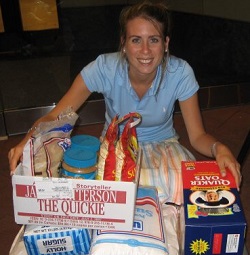
½ lb butter, ½ cup sugar, ½ cup brown sugar, 1 tsp vanilla extract, flour, salt, oatmeal, butterscotch chips, chocolate chips. Separate and bake at 375 degrees for 25 minutes.
That’s the recipe for freckled oat cookies, and a delicious artifact of my life as an accidental entrepreneur.

I started baking for fun, as a way to feed my hungry co-workers and celebrate the holidays. That hobby slowly took over my small, post-college apartment, where my two roommates graciously let me spill flour, start mild fires, and turn my love for baked goods into an online business.
Like many women entrepreneurs, I turned to friends and family for support and to the Internet for customers. I sent emails to my friends, posted the menu on my Facebook page, and shared my goals with my social network.
2007 taught me a lot about the joys of participating in global commerce — and the frustrations, like faulty shipping or the occasional mishap in which more than 500 pralines were mobbed by ants on their way to a wedding, forcing me to start the order all over again.
However brief, my year as a woman entrepreneur gave me important insight into the struggles our small business owners face, and sparked my desire to help make it a bit easier for them to expand, hire, and go global.
That’s why I’m part of a team working on securing the Trans-Pacific Partnership (TPP) — President Obama’s high-standard trade agreement that puts a premium on protecting the American worker. It’s also the first time there are chapters dedicated to the small business and e-commerce economy.
Our trade policy is actually vital to empowering women entrepreneurs and workers, both here at home and abroad.
Here are four reasons why:




88.2 percent of women business owners are the sole employee of their business with no staff to rely on. Reducing laborious and time-consuming barriers is critical to helping these business owners expand into foreign markets and is a core focus of TPP. This is a trade deal that will eliminate tariffs across the region, and make it cheaper, easier, and faster for businesses to get their products into the market, strengthen protections of intellectual property, streamline often complicated and duplicative standards, and will assist small business service suppliers by increased access to new markets and greater legal certainty.
As reported by the National Women’s Business Council, the economic impact of women-owned businesses has been estimated at $2.8 trillion and more than 23 million jobs. In fact, if women-owned businesses in the United States were a country, they would have the fifth-largest GDP in the world.
But short of becoming our own country and negotiating our own trade deal, the TPP is the best opportunity women entrepreneurs and workers across the world have to get the protections and the opportunities they need to compete in a 21st century economy.
Take a deeper dive to see what our trade policy can do for women entrepreneurs and workers here.
Then, learn more about the President’s trade deal, and who else it will help, here: obamawhitehouse.archives.gov/trade

